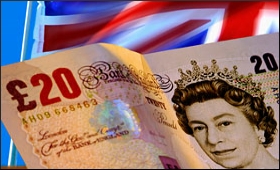|

|
Britain joins austerity club with measures amounting £40 bn
|
|

|
|
| Top Stories |
 |
|
|
|
IANS | 23 Jun, 2010
Britons bore the brunt for the second time after the global meltdown as the David Cameron government Tuesday introduced the harshest of spending cuts in several decades amounting to £40 billion, saying there was no alternative to bring down the gigantic budget deficit.
Chancellor of the Exchequer George Osborne, who set out plans for a £113bn fiscal tightening in the country's toughest Budget for a generation, told Parliament, "This emergency budget deals decisively with our country's record debt."
Osborne revealed plans to raise an additional 32 billion pounds from spending cuts - including an 11 billion-pound trimming of the welfare bill - and 8 billion pounds in tax increases.
He was quoted by The Guardian as justifying the dreaded cuts by saying: "It pays for the past. And it plans for the future. It supports a strong, enterprise-led recovery. It rewards work. And it protects the vulnerable in our society. Yes it is tough - but it is also fair."
Acting Labour Party chief Harriet Harman reacted strongly, saying the budget was "reckless" and would lead to thousands losing their jobs.
She hit out at Osborne in parliament: "It is the chancellor's first budget but we have seen it all before. It is the same old Tories, hitting hardest at those who can least afford it and breaking their promises."
Derek Simson, joint general secretary of the Unite trade union, said: "This budget is vintage Thatcher. The Lib Dems have been conned into hammering the poor, choking off investment and cuts that risk plunging this country into a longer and deeper recession. If they do not disassociate themselves from this, then the Lib Dems will have to bear the responsibility."
First, the fair part. Osborne said he would protect the poorest from the impact of a coming New Year rise in VAT to 20 percent from 17.5 percent, a two-year freeze on public sector pay, a three-year freeze on child benefits and cuts of more than 25 percent in spending by some government departments.
The VAT rise, due to come into force next January, will generate more than 13 billion pounds a year by the end of this parliament. Zero-rated items - including food and children's clothes - will remain exempt from VAT.
The operational allowance for troops in Afghanistan was doubled to 4,800 pounds, while there are no changes to disability allowances.
Osborne said a 1,000-pound increase in the income tax personal allowance to 7,475 pounds a year, and a 2 billion-pound increase in child tax credits would help those with the lowest incomes and ensure that the well-off were hardest hit by the toughest package of measures since the early 1980s.
Osborne downgraded the growth of the British economy from 2.3 percent to 1.2 percent in 2011, admitting that the spending cuts led by welfare reforms such as reduced housing benefits and stricter rules for disability benefits would impact economic progress in the short run.
He froze child benefits for three years and public sector pay for the top level officials for two years. People earning less than 21,000 pounds will each receive a flat pay rise of 250 pounds in each of the two years. An independent commission will review public sector pensions.
The budget has increased the standard rate of insurance premium from 5 percent to 6 percent and the higher rate has risen from 17.5 percent to 20 percent.
Banks and building societies will have to pay a new 2 billion pounds levy following their crucial role in causing the financial crisis that led to the longest and deepest recession in Britain. But there was also some relief, as the chancellor raised capital gains tax from 18 percent to 28 percent on high earners instead of the expected 40 percent.
Although health and international aid would not be touched, Osborne said that reductions to other government departments totalling 17 billion pounds by 2014-15 equated to 25 percent cuts over the next four years.
Osborne said that benefits would increase from next year, with the exception of pension and pension credits. This will save more than 6 billion pounds by the end of the current parliament, he said. Pensioners will get a new "triple lock guarantee" of an annual increase in line with earnings, prices, or a 2.5 percent increase, whichever is the greatest.
|
|
|
| |
|
|
|
|
|
|
|
|
|
|
|
|
|
|
| |
| Customs Exchange Rates |
| Currency |
Import |
Export |
US Dollar
|
84.35
|
82.60 |
UK Pound
|
106.35
|
102.90 |
Euro
|
92.50
|
89.35 |
| Japanese
Yen |
55.05 |
53.40 |
| As on 12 Oct, 2024 |
|
|
| Daily Poll |
 |
 |
| Do you think Indian businesses will be negatively affected by Trump's America First Policy? |
|
|
|
|
|
| Commented Stories |
 |
|
|
|
|
|
| |
|